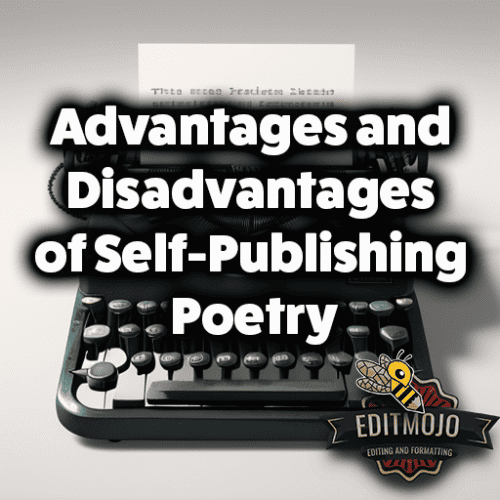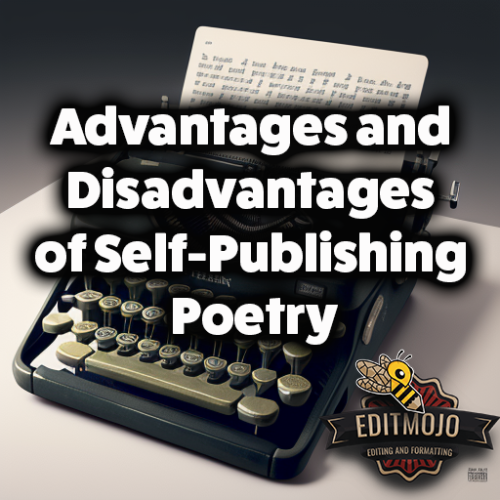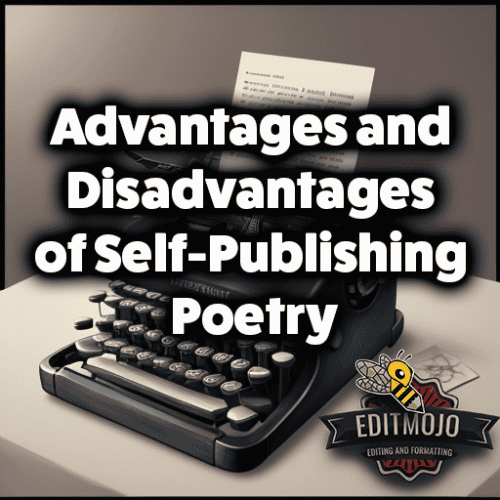Advantages and Disadvantages of Self-Publishing Poetry
Advantages and Disadvantages of Self-Publishing Poetry. Ever since the written word found its rhythm in verse, poetry has been a quintessential part of human expression. From the epic tales of Homer to the sonnets of Shakespeare, to the contemporary poets of our time, this art form has continually evolved. One significant change in recent years is how poetry reaches its audience, with self-publishing playing a massive role. This article delves into the advantages and disadvantages of self-publishing poetry, hoping to guide poets on their journey of expression.
Key Takeaways
| Advantages of Self-Publishing Poetry | Disadvantages of Self-Publishing Poetry |
|---|---|
| Complete creative control over your work | Lack of professional editorial input could lead to lower quality |
| Direct engagement and relationship-building with readers | Marketing and distribution challenges can be demanding |
| Higher profit margins and control over pricing | Financial risk due to upfront costs |
| Quicker time to market than traditional publishing | Potential lack of literary prestige and recognition |
Understanding Self-Publishing
Self-publishing, in essence, is the act of independently publishing your work, often leveraging technology and online platforms. Instead of going through traditional publishing houses, you control every aspect of your work, from writing to editing, designing, publishing, and marketing.
Some of the most popular self-publishing platforms include Amazon’s Kindle Direct Publishing, Lulu, and Blurb. Social media platforms, such as Instagram, have also become hubs for self-published poetry, with hashtags like #Instapoetry amassing millions of posts. This rise of self-publishing signifies a significant shift in the literary world, with poets having more control over their work than ever before.

Advantages of Self-Publishing Poetry
Creative Control
When you self-publish, you are the captain of your ship. You decide the content, the style, and the structure. There’s no need to compromise your vision to fit into a mold that a publishing house might dictate. This level of freedom allows your poetry to truly reflect you, with each line and stanza mirroring your thoughts, feelings, and experiences.
For instance, Rupi Kaur, an internationally acclaimed self-published poet, used her unique style and illustrations, bypassing traditional publishing norms, and it paid off, garnering millions of readers worldwide.
Direct Engagement with Readers
Another advantage of self-publishing is the opportunity to connect directly with your readers. Platforms like Instagram and Goodreads facilitate conversations between authors and readers.
You can build your own personal brand and get immediate feedback from your audience. This helps you understand your readers better, their likes and dislikes, and what resonates with them.

Profit Margin and Pricing Control
With traditional publishing, poets often receive a small royalty per book sold. In contrast, self-publishing allows you to keep the majority of the revenue. You also have control over the pricing of your book, allowing you to adjust it according to your readers’ preferences and market trends.
Time to Market
The traditional publishing process can be lengthy. It could take years from the time you submit your manuscript to when the book is available to the public. Self-publishing, however, can drastically reduce this time, with some platforms publishing the book almost immediately after you finish the process.
Disadvantages of Self-Publishing Poetry
Lack of Professional Editorial Input
One potential downside of self-publishing is the absence of professional editing. Good editors do more than correct grammar and punctuation. They can provide invaluable input on flow, consistency, and impact. This lack of professional input might result in a lower-quality final product. It’s therefore crucial for self-publishers to find reliable editing services.
Marketing and Distribution Challenges
Promoting your book can be a challenging task. Traditional publishers have marketing teams and established distribution channels that ensure your book reaches as many people as possible. As a self-publisher, you must undertake this task yourself or hire professionals to do so, adding to the upfront cost.
Investment and Financial Risk
While the profit margins are higher, so are the risks. Self-publishing can require a significant upfront investment, including professional editing, cover design, and marketing. If your book does not sell as well as expected, you might not recoup your investment.

Lack of Literary Prestige and Recognition
Despite the growth and success stories of self-publishing, some circles still perceive self-published works as less prestigious. Getting your self-published poetry book reviewed by notable critics or recognized by prestigious awards can be challenging.
The Intersection of Self-Publishing and Traditional Publishing
It’s worth noting that self-publishing and traditional publishing are not mutually exclusive. Many poets opt for a hybrid approach, publishing some works traditionally while self-publishing others.
Some traditional publishers actively scout for self-published works that have done well. E.L. James’s Fifty Shades of Grey series, initially self-published, was later picked up by a traditional publisher due to its immense success.
Making the Decision: Factors to Consider in Choosing Self-Publishing
Choosing between self-publishing and traditional publishing depends on your personal goals, resources, and preferences.
If you value creative control, direct engagement with your audience, and potentially higher earnings, self-publishing could be the right path for you. However, if you prefer the input of professional editors, established distribution channels, and don’t mind sharing the revenue, traditional publishing might be more suitable.
As Emily Dickinson wisely said, “Publication – is the Auction / Of the Mind of Man”. You are selling your ideas and expressions, so it’s important to choose a method that aligns with your vision.
Conclusion (Advantages and Disadvantages of Self-Publishing Poetry)
The journey of self-publishing poetry is one filled with freedom, excitement, and challenges. Whether you choose to self-publish or go the traditional route, what truly matters is your expression through poetry. As with any journey, there will be obstacles, but the beauty lies in overcoming them and sharing your art with the world.
For further resources, you may find platforms such as Reedsy, Scribophile, and Poets & Writers helpful. These offer a range of tools, courses, and communities to support both self-published and traditionally published poets. And remember, the world is waiting for your verse. Keep writing, keep expressing, and most importantly, keep enjoying the journey of poetry.
Top Five Questions and Answers
| Questions | Answers |
|---|---|
| What is self-publishing in poetry? | Self-publishing in poetry is the process of independently publishing your work, often leveraging technology and online platforms, without going through traditional publishing houses. |
| What are some platforms for self-publishing poetry? | Some popular platforms include Amazon’s Kindle Direct Publishing, Lulu, and Blurb. Social media platforms, such as Instagram, are also commonly used. |
| What is a key advantage of self-publishing poetry? | A significant advantage of self-publishing is the complete creative control it offers. Self-published poets decide the content, style, structure, and pricing of their work. |
| What are the challenges of self-publishing poetry? | Some challenges include the lack of professional editorial input, marketing and distribution challenges, financial risks due to upfront costs, and potential lack of literary prestige. |
| Can a self-published poet shift to traditional publishing? | Yes, self-publishing and traditional publishing are not mutually exclusive. Many poets opt for a hybrid approach, and some successful self-published works get picked up by traditional publishers. |
Top Seven Resources and Further Reading
- Kindle Direct Publishing: Self-publishing tool by Amazon
- Lulu: Self-publishing and book printing platform
- Blurb: Independent publishing platform
- Reedsy: Resources for writing, editing, and publishing
- Scribophile: Writing community for serious writers
- Poets & Writers: Resource for creative writers
- Jane Friedman: Resource for writing, publishing, and the business of books
